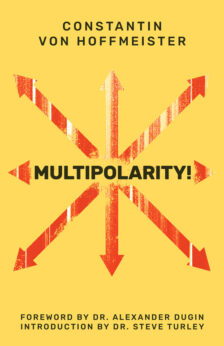Born in 1898, Julius Evola watched as the 20th century unfolded and the sun set upon the West. By the time he reached the end of his career and wrote Ride the Tiger, Evola had surrendered to the forces of dissolution, but only on the material plane. In a life devoted to transcendence, he still believed the differentiated man had the possibility of “surfing the Kali Yuga” and escaping the modern world.
Critiquing the Matrix with a consciousness that’s still trapped inside of it is hardly the same thing as finding a way out. We’re all guilty of watching in horror, fascination and disbelief as the West implodes in an orgiastic supernova. But, as Evola points out, the process cannot be stopped and the forces unleashed — tyranny from the top and anarchy from the bottom — are too elemental to be contained by yesterday’s world, the anti-Traditional world of bourgeois institutions such as universities, media, democracy and capitalism, all of which are modern human inventions.
What “escape” looks like will differ for each man, but two things are fundamental: paths of transcendence have traditionally been either through action or contemplation, which means you’re either some kind of warrior or some kind of priest, to which I’d include all manner of artists and initiates. What these two paths have in common is that both reach a state of consciousness that is beyond life and death, for the warrior awakens not knowing if this day will be his last, and the initiate knows that his spirit is his true self, and his earthly self but a temporary incarnation.
* * *
Our three great divine gifts are will, reason and imagination. Everything man has ever done came into manifestation because he imagined it could be done, reasoned that it should be done, and willed it into reality. True imagination, the kind Evola wrote about early in his career with the UR Group, is the supreme faculty bridging the human and divine, and is understood by initiates as a kind of magic power.
And so I invoke this power — in myself and you the reader — to imagine showing Julius Evola how the modern medium of video games can be used as part of a spiritual ascesis and the quest for the Olympian dimension within ourselves. Much of Evola’s metaphysical writings concern the process of turning poison into medicine, so it’s an amusing exercise to imagine sitting down with him to play Assassin’s Creed, the popular video game franchise known for its open-world environments. The AC game called Odyssey is set in ancient Greece, and the YouTube channel Daydream Gaming has edited and uploaded “walking tours” of the game’s cities and islands. Because the videos unfold with the verisimilitude of everyday life, they allow us to immerse ourselves in a Traditional society far more effectively than by watching plot-oriented films such as Troy, 300 or Jason and the Argonauts.
And so let’s skip the gameplay, and have Evola be our guide on a walking tour through the world of Tradition.
The first thing you will notice, I imagine Evola saying as we summon the power of imagination and slip into the world of ancient Athens, is that everything is ordered “from above” and rebounds back from earth to the sky. The classical architecture expresses the stability of the Olympian realm of Being, which directs the contingent world of human affairs. Towering statues of gods and heroes are everywhere, pointing the way towards the sun by day and the stars by night. The divine world is ever at the forefront of the minds of the inhabitants of this world, serving as both a warning of divine law while also providing a feeling of protection and guiding wisdom for the citizens below.
Sacred fires burn everywhere, symbols of the eternal flame that lives in the hearts of these people and can never be extinguished — consider that I’m writing about this fire now in the year 2024, and using a video game to make my point. As we stroll the streets of Athens, everywhere are seen people praying or invoking the gods in groups, further making the sacred felt as a real and living presence.
That said, Evola would point out, there is a world of difference between the exoteric public demonstrations of fidelity to the gods and the world of the Mystery schools — unseen in these Assassin’s Creed walking-tour videos — where the guardians of esoteric metaphysical doctrines would have worked to spiritually guide the people from within the top-down divine order “from above.” These are the men of the first caste in Traditional Indo-European spirituality, those considered to be of the same stock as the gods, in direct communion with deities such as Apollo, Aphrodite, Aries and Hermes, which are best understood as dynamic spiritual forces expressed astrologically through the stars and planets, and which exert their influence upon man’s imagination, which, again, is the medium through which mortals forge rapport with deities.
Only the first two castes — spiritual leaders and the warrior nobility — possess rites that put them in communion with higher powers. Due to the qualitative differences in men, merchants and servants do not have the ability to harness invisible forces and would only be confused by them. For them it is best to see the visual representation of the gods in the form of statues and temples, and to pay their respects.
* * *
So there’s a brief sketch of what Evola might point out as we employ modern technology to envision life in a Traditional civilization. But, in the spirit of Ride the Tiger, what does this imagination exercise mean for us in the world of 2024?
The first thing to note is that you will not have a life-altering experience viewing the walking-tour videos of Assassin’s Creed until you have achieved a certain level of metaphysical knowledge and the ability to access higher states of consciousness outside of space and time. Your consciousness will also need to be liberated from the materialist notion that you are viewing a certain historical period that once existed in the world of fact, for that is not the point of this exercise at all. That a video depicts Athens or Alexandria of the 4th century BC is incidental; what your intellectual intuition should understand is: “This is what a Traditional society feels like, whether 2,000 years in the past or 2,000 years in the future.”
The difference between this simulacrum of the Traditional world and the world outside your window is the difference between a spiritual society and a materialist one, between divine values and human ones, between a heavenly orientation to the Good, True and Beautiful, and an infernal orientation to the Bad, False and Ugly. The videos also have the power to re-orient you when you enter the contemporary world while maintaining this higher reference point and allowing it to permeate your entire being, which Evola describes eloquently in the essay entitled “Aristocracy and the Initiatic Ideal” in the third volume of the UR Group’s book on magic. Consciousness stays firmly at the “center,” and the modern world is viewed from the point of view of divine reality, or Truth, while the Matrix is revealed precisely as the counterfeit creation that it is.
I’ve thought ceaselessly about what adaptations are necessary today for the individual apropos of Evola’s introductory remarks in Ride The Tiger, and I’m happy to have discovered the Assassin’s Creed walking videos. They can be viewed during meals instead of films, since you too have probably realized that there’s no story more intensely riveting than the one we’re actually living through.
And so in the evening I’ll take out the black mink throw I use for a yoga mat and sit down on the floor with my stuffed tiger named Julius. Over a plate of bread, wine, fish, olives, figs and honey, I’ll put on one of these walking-tour videos and use modern technology to help make eating a sacred ritual. I prefer to mute the sound effects as I believe they are too materialist and impede the imagination from accessing higher states of being. Instead I’ll play a highly edited classical playlist based on a lifetime of connoisseurship. That means no bombastic Romantic symphonies as that vibrational frequency belongs to the struggles of the past and future; in its place are reverie-inducing Impressionist pieces arranged for harp and flute, which harmonize well with visions of the ancient world.
One final remark: if on your strolls through Athens you observe the citizens milling about and find yourself why there’s no sight of the patricians of Dorian and Achean stock who created the civilization, just tell yourself it’s the fourth caste’s day off.
Watch “Walking Tour in Ancient Greece.”
Christian Chensvold is the author of Dark Stars: Heroic Spirituality in the Age of Decadence, which reveals the influence of Julius Evola’s esoteric writings.







